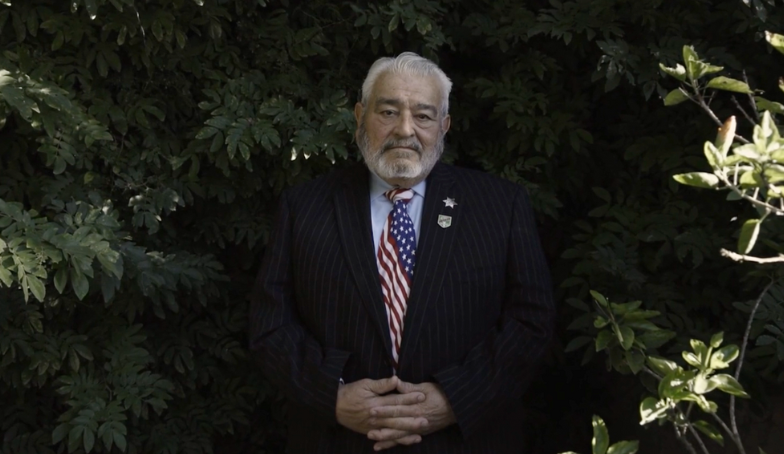Produced by: Kelsey Bolar & Andrea Mew
Written by: Andrea Mew
Retired Los Angeles County Sheriff Detective Sergeant Richard Valdemar took on a lifetime career in law enforcement because, as he put it, he’s an idealist.
“I joined because I thought we were going to help people,” he told Independent Women’s Forum, reflecting on his journey from working in the Los Angeles County Jail to the sheriff’s department to the military police. “Inmates are people, women are people.”
But the law enforcement landscape today looks very different from how Sgt Valdemar experienced it at the height of his career. Back then, male inmates who identified as “transgender women” or simply dressed as women were housed separately from female inmates. Today, legislation such as California’s SB-132 now allows male inmates to be housed with women if they self-identify as a non-male gender.
“If this doesn’t constitute bigotry, I don’t know what does,” Sgt Valdemar said.
Now retired from the sheriff’s department but still working within the federal court system and the attorney general’s office in Arizona, Sgt Valdemar isn’t witnessing the fallout of SB-132 firsthand. However, many of his peers are still on staff in prisons nationwide and approach him with their concerns.
“In an attempt to integrate the yards, which is what they call it, California and other prison systems have begun putting people that formerly were held apart for their own safety or for the safety of others, [and] have dumped them into the yards,” he said. The shift, he added, caused an unprecedented rise in violence.
Independent Women’s Forum has documented multiple cases of female inmates being harassed, intimidated, and abused by male inmates who identify as a non-male gender and gained access to women’s prisons under SB-132. This standard even has global implications, as male inmates posing as “transgender women” have been documented raping female inmates from New York City to Glasgow, Scotland.
Sgt Valdemar emphasized how female inmates—many of whom are survivors of physical and sexual assault—are subject to the same fears as women in the free world. Even though they end up in prison and have to serve time for their crime(s), state and federal governments have an obligation to ensure their safety and security while incarcerated.
“When we compromise that, we might as well be a third-world country if we can’t protect the prisoners,” Sgt Valdemar said.
Proponents of gender self-identification laws often argue that forcing male inmates who identify as transgender women to be housed in a men’s prison violates their right to privacy, and therefore, they deserve to be housed with the population they identify with. However, Sgt Valdemar argued that’s not the case.
“When you’re convicted of a felony, and you’re put in the prison system, the safety and security of the system—the institution—takes priority over the rights of any individual within,” he said, explaining that this precedent is why authorities can wiretap their phone calls, subject them to searches, and watch them with surveillance cameras. He continued:
“They can’t vote, they can’t possess guns. There’s all kinds of things that they can’t do because they’ve lost those privileges once they were convicted of a felony. So if I self-identify as something that I’m not, the system doesn’t have to accept that if it compromises the safety and security of the people who have to live within that system.”
When Sgt Valdemar worked in the Los Angeles County Jail in the 1970s, he said there was a separate housing wing for “queens,” which was a nickname for men who dressed in women’s clothes. He said that law enforcement officials kept these men in the men’s prison but separate from the general male population to protect everyone’s safety.
“Placing the wolf in the den or in the pen with the lambs is not in the spirit of that law,” Sgt Valdemar said.
Sgt Valdemar is one of only a few whistleblowers from the prison system to speak publicly about the implications of housing men in women’s prisons, but he told IWF that he doesn’t blame others for staying silent. Instead, he feels sorry for prison staff because they see the injustice and know it to be wrong, but the possibility of being retaliated against and losing their livelihood stokes a very real sense of fear.
“Even my friends, when I questioned them about, ‘How do you house a transgender person in the system,’ they don’t want to talk about that. That’s like talking about alcoholism in the family,” he said.
Sgt Valdemar said he tried to recruit some of his colleagues who currently work in corrections to take part in IWF’s Cruel & Unusual Punishment documentary series, but “no one would do it.”
In any case, Sgt Valdemar explained that his peers in both Arizona and the Federal correctional systems have told him that their correctional administrators and lawyers are actively pushing to enact the same gender policies, following the lead of “progressive” California.
Sgt Valdemar said over the years, he grew somewhat cynical about the correctional world. But never in his most downhearted moments did he ever imagine that women would be forcibly housed alongside male offenders—many of whom are violent criminals and outright sex offenders.
“You can see that this is injustice with a capital I,” he said.










